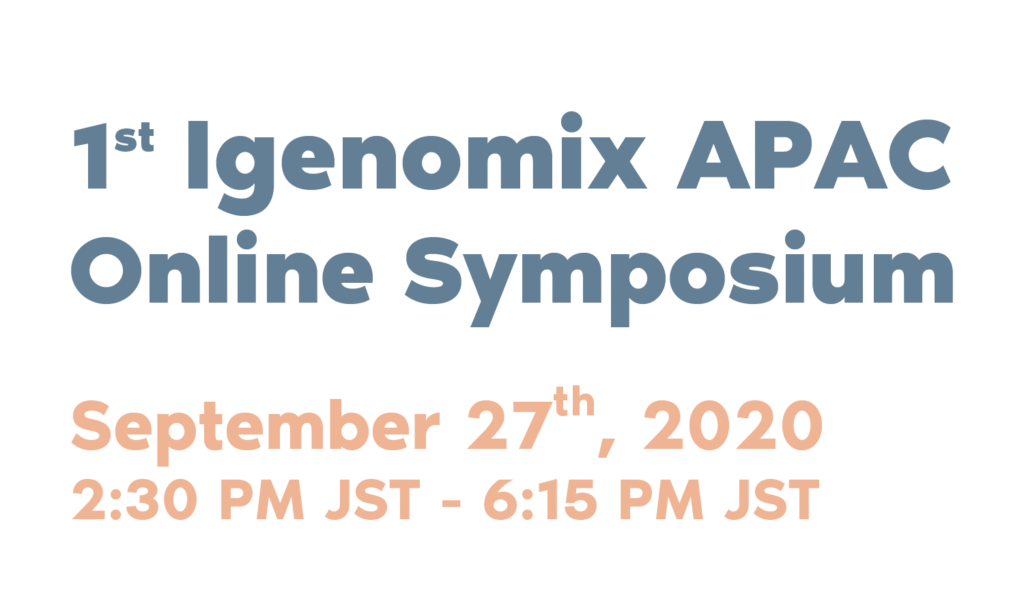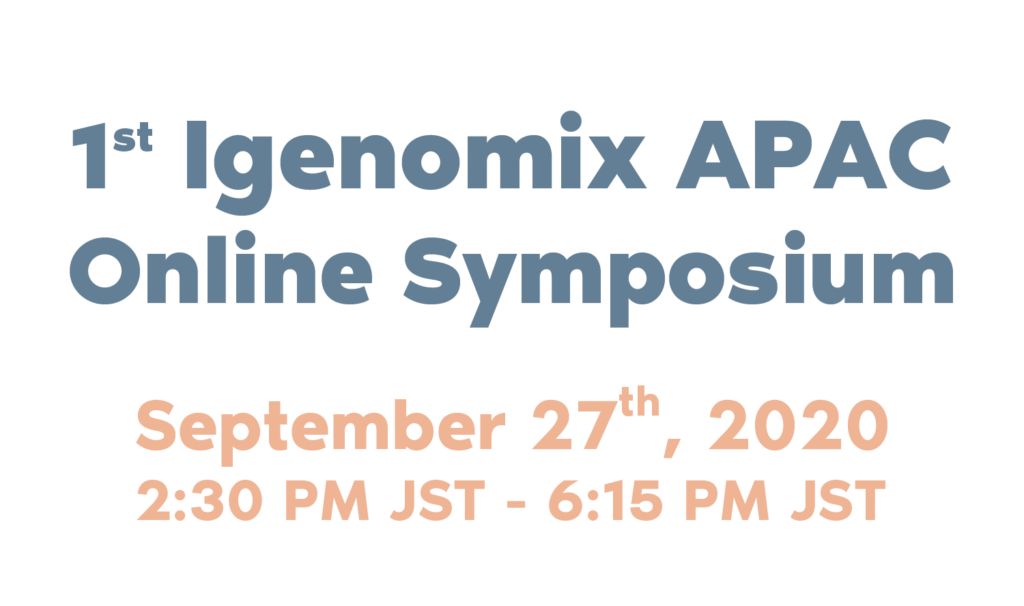

You are invited to attend the
1st Igenomix APAC Online Symposium!
To maximize the reproductive outcome for our patients, sharing knowledge and experience has been an essential part in latest IVF industry.
This September, Igenomix is hosting an online symposium, presenting talks by leading researchers and clinicians in the Asia-Pacific region, as well as Dr. Carmen Rubio from Spain, developer of our newest technology: EMBRACE (niPGT-A).
Program
September 27th, 2020 2:30pm JST – 6:15pm JST

2:30 – 3:15 PM JST
How to sustain IVF Clinic operations during COVID-19
Dr. Shyr-Yeu Lin, MD, PhD
Taipei Fertility Center (Taiwan)
Abstract
As COVID-19 is still spreading over the world, medical services for infertility treatment including IVF has been being reduced in amount because of the governmental and epidemiological strategies for controlling this infectious disease. However, prognosis of infertility treatment is time-sensitive. It is even urgent in some situations, i.e., cancer treatment. The talk will present the current status of running IVF in Taiwan during COVID-19 prevalence.
Biography
Academic Degrees
2004 Ph.D. Monash Institute of Medical Research (formerly Monash Institute of Reproduction and Development), Monash University, Melbourne, Australia.
1988 M.D. Chung-Shan Medical University, Taichung, Taiwan.
Academic and Professional Experience
2020- present Vice Superintendent, Taipei Fertility Center, Taipei, Taiwan.
2016- 2019 Assistant Professor, Department of Obstetrics and Gynecology, Taipei Medical University, Taipei, Taiwan.
2005- 2016 Adjunct Assistant Professor, Department of Biomedical Sciences, Chung Shan Medical University, Taichung, Taiwan.
2005- 2015 Adjunct Assistant Professor, Department of Biological Science and Technology, National Chiao Tung University, Hsinchu, Taiwan.
2004- 2016 Director, Stem Cell Lab, Department of Medical Research, Mackay Memorial Hospital, Taipei, Taiwan.
2003- 2016 Senior Attending Physician, Division of Infertility and Reproductive Endocrinology, Department of Obstetrics and Gynecology, Mackay Memorial Hospital, Taipei, Taiwan.
Publications highlights (Peer-reviewed journal articles in English)
1. Chou YC, Chen CH, Chen MJ, Chang CW, Chen PH, Yu MH, Chen YJ, Tsai EM, Yang PS, Shyr-Yeu Lin et al. Killer cell immunoglobulin-like receptors (KIR) and human leukocyte antigen-C (HLA-C) allorecognition patterns in women with endometriosis. Sci Rep 2020;10: 4897.
2. Lee YX, Chen CH, Shyr-Yeu Lin, Lin YH, Tzeng CR. Adjusted mitochondrial DNA quantification in human embryos may not be applicable as a biomarker of implantation potential. Journal of assisted reproduction and genetics 2019;36: 1855-1865.
3. Hsieh CE, Lee RK, Sun FJ, Li RS, Shyr-Yeu Lin, Lin MH, Hwu YM. Early blastulation (EB) of day 4 embryo is predictive of outcomes in single embryo transfer (SET) cycles. Taiwanese journal of obstetrics & gynecology 2018;57: 705-708.
4. Liao CC, Lee RK, Shyr-Yeu Lin, Lin MH, Hwu YM. Outcomes of anti-Mullerian hormone-tailored ovarian stimulation protocols in in vitro fertilization/intracytoplasmic sperm injection cycles in women of advanced age. Taiwanese journal of obstetrics & gynecology 2016;55: 239-243.
5. Vankayala R, Chiang CS, Chao JI, Yuan CJ, Shyr-Yeu Lin, Hwang KC. A general strategy to achieve ultra-high gene transfection efficiency using lipid-nanoparticle composites. Biomaterials 2014; 35:8261-72.
6. Lin MH, Shao-Ying Wu F, Kuo-Kuang Lee R, Li SH, Shyr-Yeu Lin, Hwu YM. Dual trigger with combination of gonadotropin-releasing hormone agonist and human chorionic gonadotropin significantly improves the live-birth rate for normal responders in GnRH-antagonist cycles. Fertil Steril 2013; 100:1296-302.
7. Lin MH, Hwu YM, Shyr-Yeu Lin, Lee RK. Treatment of infertile women with unilateral tubal occlusion by intrauterine insemination and ovarian stimulation. Taiwanese journal of obstetrics & gynecology 2013; 52:360-4.
8. Wu FS, Hwu YM, Lee RK, Li SH, Sun FJ, Lin MH, Shyr-Yeu Lin. First trimester ultrasound estimation of gestational age in pregnancies conceived after in vitro fertilization. European journal of obstetrics, gynecology, and reproductive biology 2012; 160:151-5.
9. Ku PY, Lee RK, Shyr-Yeu Lin, Lin MH, Hwu YM. Comparison of the clinical outcomes between fresh blastocyst and vitrified-thawed blastocyst transfer. Journal of assisted reproduction and genetics 2012; 29:1353–6.
10. Robert KK Lee, Frank SY Wu, Ming-Huei Lin, Shyr-Yeu Lin and Yuh-Ming Hwu. The predictability of serum anti-Mullerian level in IVF/ ICSI outcomes for patients of advanced reproductive age. Reprodcutive Biology and Endocrinololgy 2011;9: 115.
11. Li-Ling Chou, Yuh-Ming Hwu, Ming-Huei Lin, Shyr-Yeu Lin, Robert Kuo-Kuang Lee. Outcomes of high initial daily doses of gonadotropin in patients with poor ovarian reserve. Taiwanese Journal of Obstetrics and Gynecology 2010;49: 442-448.
12. Shyr-Yeu Lin*, Chia-Lin Chen, Yen-Ling Wu, Yuh-Cheng Yang and Yuh-Ming Hwu. The ratio of Wnt3a to BMP4 doses is critical to their synergistic effects on the proliferation of differentiating mouse embryonic stem cells. Cell Proliferation 2008;41: 492-505.
13. Shyr-Yeu Lin, Rebecca G. Craythorn, Anne E. O’Connor, Martin M. Matzuk, Jane E. Girling, John R. Morrison and David M. de Kretser*. Female infertility and disrupted angiogenesis are actions of specific follistatin isoforms. Molecular Endocrinology 2008;22: 415-429.
14. Yuh-Ming Hwu, Sheng-Hsiang Li, Robert Kuo-kuang Lee, Yu-Hui Tsai, Tien-Shun Yeh, Shyr-Yeu Lin. Increased expression of platelet-derived growth factor C messenger ribonucleic acid in uterine leiomyomata. Fertility & Sterility 2008;89: 468-471.
15. Wen-Jui Yang, Yuh-Ming Hwu, Robert Kuo-kuang Lee, Sheng-Hsiang Li, Shyr-Yeu Lin, and Steven Fleming. Early cleavage does not predict treatment outcome following the use of GnRH antagonists in women older than 35. Fertility & Sterility 2007;88: 1573-1578.
16. Shyr-Yeu Lin, John R. Morrison, Martin M. Matzuk and David M. de Kretser*. Spermatogenesis does not require the local production of follistatin. Reproduction 2006;132: 601-605.
17. Yuh-Ming Hwu, Shyr-Yeu Lin, W.-Y. Huang, M.-H. Lin, Robert Kuo-kuang Lee. Ultra-short metformin pretreatment for clomiphene citrate-resistant polycystic ovary syndrome. International Journal of Gynecology and Obstetrics 2005; 90:39-43.
18. D.M. de Kretser, J.J. Buzzard, Y. Okuma, A.E. O’Connor, T. Hayashi, Shyr-Yeu Lin, J.R. Morrison, K.L. Loveland, M.P. Hedger. The role of activin, follistatin and inhibin in testicular physiology. Molecular and Cellular Endocrinology 2004;225:5 7-64.
19. Shyr-Yeu Lin, John R. Morrison, David J. Phillips and David M. de Kretser. Regulation of ovarian function by the TGF-β superfamily and follistatin. Reproduction 2003;126: 133-148.

3:15 – 4:00 PM JST
Efficacy of EMMA and ALICE on IVF outcome in women with RIF
Dr. Nanako Iwami, PhD
Kamiya Ladies Clinic (Japan)
Abstract
Objective: Following results of endometrial microbiome metagenomic analysis (EMMA) and analysis of infectious chronic endometritis (ALICE), is there a post-treatment effect for the patients with recurrent implantation failure (RIF)?
Materials and Methods: This is a prospective cohort study at a single fertility center from July 2018 to March 2020. A total of 158 women under 43 years old who continued to undergo IVF-ET treatment were enrolled. RIF was defined as the failure of at least three previous ET attempts. We suggested EMMA/ALICE for the RIF patients and confirmed whether patients desired tests, or not. The patients were treated following the descriptions specified in EMMA/ALICE reports. Primary outcome measure is Cumulative clinical pregnancy rate of two additional ET after they were suggested tests. Statistical analysis used unpaired t-test and chi-square contingency.
Results: The difference of the clinical pregnancy rate and ongoing pregnancy rate were significantly higher in the study group than in the control group.
Conclusions: With the NGS technology, dysbiosis of microbiota was found in more than half of the recruited patients. Personalized treatment recommendations based on the EMMA/ALICE results can improve IVF outcome of RIF. Moreover, broad-spectrum antibiotics treatments can be avoided.
Biography
A graduate of Sapporo Medical University, Dr. Nanako Iwami has trained extensively throughout Sapporo Medical University Hospital, Itabashi Chuo Hospital, and Tomakomai Ladies Clinic. She is currently on staff at Kamiya Ladies Clinic, while continuing with research in assisted reproductive technology alongside Dr. Kamiya. Dr. Iwami is a member of the National Board of Medicine, the Japanese Board of Obstetrics and Gynecology, and the Japanese Board of Reproductive Medicine
Publications highlights (Peer-reviewed journal articles in English)
1, Iwami N, Kawamata M, Ozawa N, Yamamoto T, Watanabe E, Moriwaka O, Kamiya H. “New trial of progestin-primed ovarian stimulation using dydrogesterone versus a typical GnRH antagonist regimen in assisted reproductive technology.” Arch Gynecol Obstet. 2018 Sep;298(3):663-671.
2, Iwami N, Ishioka S, Endo T, Baba T, Nagasawa K, Takahashi M, Sugio A, Takada S, Mariya T, Mizunuma M, Saito T. “First case of vaginal radical trachelectomy in a pregnant Japanese woman.” IntJ Clin Oncol. 2011 Dec;16(6):737-40

4:00 – 4:45 PM JST
Personalized Embryo Transfer improves implantation rate in patients with RIF
Dr. Tomonori Ishikawa, MD, PhD
Tokyo Medical and Dental University (Japan)
Abstract
In order to obtain better ART outcomes, both euploid blastocysts and synchronized endometrium are required. Although PGT-A had not been allowed in Japan until now, this year the Japanese Society of Obstetrics and Gynecology has just launched the clinical trial of PGT-A for recurrent implantation failure and recurrent pregnancy loss. This enables the transfer of the euploid blastocyst and is expected to decrease the miscarriage rate and improve the implantation rate per embryo transfer. However, the implantation rate is around 70% even after the transfer of euploid embryo, so the endometrial factor is crucial. Endometrial receptivity analysis (ERA), which is an analysis of the expression level of 236 genes related to endometrial implantation ability using next generation sequencing, has been reported to be able to determine each woman’s unique personalized embryo transfer timing, therefore synchronizing the embryo transfer with the individualized window of implantation. In this online symposium, I will talk about the current status of ART and introduction of ERA test in Japan and report the results of our retrospective study of ERA test for patients with recurrent implantation failure.
Biography
2017.01-2016.12
Tokyo Medical and Dental University, Graduate School of Medical and Dental Sciences, Department of Comprehensive Reproductive Medicine,Assistant Professor
2017.01-2019.09
Tokyo Medical and Dental University,Graduate School of Medical and Dental Sciences, Department of Pediatrics, Perinatal and Maternal Medicine (Ibaraki),Junior Associate Professor
2019.10-Now
Tokyo Medical and Dental University,Graduate School of Medical and Dental Sciences,Department of Pediatrics, Perinatal and Maternal Medicine (Ibaraki),Associate Professor
A graduate of Tokyo Medical and Dental University’s Graduate School of Medical and Dental Sciences, Dr. Tomonori Ishikawa is highly experienced in the field of reproductive medical research. Now an Associate Professor in the Department of Pediatrics, Perinatal and Maternal Medicine (Ibaraki), Dr. Ishikawa has also co-authored over 20 papers in the past 13 years investigating various mechanisms in reproductive medicine.
Publications highlights (Peer-reviewed journal articles in English)
1. Asghari A, Ishikawa T, Hiramitsu S, Lee WR, Umetani J, Bui L, Korach KS, Umetani M. 27-Hydroxycholesterol Promotes Adiposity and Mimics Adipogenic Diet-induced Inflammatory Signaling. Endocrinology. 2019.08
2. Fusegi A, Oshima N, Nakasuji T, Ishikawa T, Wakana K, Yoshiki N, Miyasaka N. Port site recurrence and unusual diffuse subcutaneous metastases of unexpected early stage ovarian cancer after laparoscopic surgery: a case report. Journal of rural medicine : JRM. 2019.05; 14 (1): 143-147.
3. Nakasuji Takashi, Kawai Kiyotaka, Ishikawa Tomonori, Teraoka Kaori, Takeuchi Shiho, Miyagawa Tomoko, Nara Kazuko, Kidera Nobuyuki, Harada Tatsuya, Miyasaka Naoyuki. Random-start ovarian stimulation with aromatase inhibitor for fertility preservation in women with Japanese breast cancer. Reproductive Medicine and Biology. 2019.04; 18 (2): 167-172.
4. Ishihara Osamu, Jwa Seung Chik, Kuwahara Akira, Ishikawa Tomonori, Kugu Koji, Sawa Rintaro, Banno Kouji, Irahara Minoru, Saito Hidekazu. Assisted reproductive technology in Japan: A summary report for 2016 by the Ethics Committee of the Japan Society of Obstetrics and Gynecology Reproductive Medicine and Biology. 2019.01; 18 (1): 7-16.
5. Hiraoka K, Kitamura S, Otsuka Y, Kawai K, Harada T, Ishikawa T. Effects of sperm direction in Piezo-ICSI on oocyte survival, fertilization, embryo development and implantation ability in humans: A preliminary study. Journal of Obstetrics and Gynaecology Research. 2018.10;
6. Hiramitsu S, Ishikawa T, Lee WR, Khan T, Crumbley C, Khwaja N, Zamanian F, Asghari A, Sen M, Zhang Y, Hawse JR, Minna JD, Umetani M.. Estrogen Receptor Beta-Mediated Modulation of Lung Cancer Cell Proliferation by 27-Hydroxycholesterol. Frontier Endocrinology. 2018.08;
7. Saito K., Kuwahara A., Ishikawa T., Nakasuji T., Miyado M., Miyado K., Fukami M., Miyasaka N., Irahara M., Saito H.. Pregnancy after frozen-thawed embryo transfer during hormonal replacement cycle is associated with hypertensive disorders of pregnancy and placenta accreta HUMAN REPRODUCTION. 2018.07; 33 129.
8. Hiraoka K., Otsuka Y., Kawai K., Harada T., Ishikawa T.. Effects of sperm direction (head first injection, tail first injection) in Piezo-ICSI on oocyte survival, fertilization and embryo morphokinetics in humans HUMAN REPRODUCTION. 2018.07; 33 239-240.
9. Kawai K, Ishikawa T, Ohuchi K, Kidera K. Kawahara M, Hiraoka K, Ogawa O, Masuzawa M, Harada T, Miyasaka N. WHO Group1 ovulation disorder successfully treated with recombinant follicle stimulating hormone: A revisit to the role of luteinizing hormone and estradiol Journal of Medical and Dental Sciences. 2018.06;
10. Kawai K, Harada T, Ishikawa T, Sugiyama R, Kawamura T, Yoshida A, Tsutsumi O, Ishino F, Kubota T, Kohda T. Parental age and gene expression profiles in individual human blastocysts. Scientific reports. 2018.02; 8 (1): 2380.
11. Saito H, Jwa SC, Kuwahara A, Saito K, Ishikawa T, Ishihara O, Kugu K, Sawa R, Banno K, Irahara M. Assisted reproductive technology in Japan: a summary report for 2015 by The Ethics Committee of The Japan Society of Obstetrics and Gynecology Reproductive Medicine and Biology. 2017.12; ( DOI )
12. Saito K., Kawai K., Tatsumi K., Miyado M., Katsumi M., Nakamura S., Ishikawa T., Miyasaka N., Fukami M.. POR mutations as novel genetic causes of female infertility due to partial 17 alpha-hydroxylase deficiency HUMAN REPRODUCTION. 2017.07; 32 104-105.
13. Irahara M, Kuwahara A, Iwasa T, Ishikawa T, Ishihara O, Kugu K, Sawa R, Banno K and Saito H.. Assisted reproductive technology in Japan: a summary report of 1992–2014 by the Ethics Committee, Japan Society of Obstetrics and Gynecology Reproductive Medicine and Biology. 2017.04; 16 126-132.
14. Saito K, Miyado K, Yamatoya K, Kuwahara A, Inoue E, Miyado M, Fukami M, Ishikawa T, Saito T, Kubota T, Saito H.. Increased incidence of post-term delivery and Cesarean section after frozen-thawed embryo transfer during a hormone replacement cycle. Journal of Assisted Reproduction and Genetics.. 2017.01; 34 465-470.
15. Umetani Michihisa, Ghosh Pritam, Ishikawa Tomonori, Umetani Junko, Ahmed Mohamed, Mineo Chieko, Shaul Philip W. The cholesterol metabolite 27-hydroxycholesterol promotes atherosclerosis via proinflammatory processes mediated by estrogen receptor alpha. Cell Metab. 2014.07; 20 (1): 172-182.
16. Lee WR, Ishikawa T, Umetani M.. The interaction between metabolism, cancer and cardiovascular disease, connected by 27-hydroxycholesterol. Clin Lipidol.. 2014.06; 9 (6): 617-624.
17. Wu Q, Ishikawa T, Sirianni R, Tang H, McDonald JG, Yuhanna IS, Thompson B, Girard L, Mineo C, Brekken RA, Umetani M, Euhus DM, Xie Y, Shaul PW.. 27-Hydroxycholesterol promotes cell-autonomous, ER-positive breast cancer growth. Cell Rep.. 2013.11; 5 (3): 637-645.
18. Ishikawa T, Yuhanna IS, Umetani J, Lee WR, Korach KS, Shaul PW, Umetani M. . LXRβ/estrogen receptor-α signaling in lipid rafts preserves endothelial integrity. J Clin Invest.. 2013.08; 123 (8): 3488-3497.
19. Tajima M, Harada T, Ishikawa T, Iwahara Y, Kubota T.. Augmentation of arginase Ⅱ expression in the human endometrial epithelium in the secretory phase. J Med Dent Sci.. 2012.12; 59 (4): 75-82.
20. Shimizu Y, Minaguchi R, Ishikawa T, Harada T, Yoshiki N, Kubota T.. Increase in the concentration of cytosolic-free calcium induced by human follicular fluid was decreased in single human spermatozoon with abnormal morphology. 2008.07; 143-149.
21. Ishikawa T, Harada T, Kubota T, Aso T.. Testosterone inhibits matrix metalloproteinase-1 production in human endometrial stromal cells in vitro. Reproduction.. 2007.06; 133 (6): 1233-1239.
22. Ishikawa T, Harada T, Koi H, Kubota T, Azuma H, Aso T.. Identification of arginase in human placental villi. Placenta.. 2007.02; 28 (2-3): 133-138.

4:45 – 5:30 PM JST
Using EndomeTRIO to improve clinical outcomes for non-RIF patients: the Chengdu Xinan experience
Dr. Ya Li, MD, PhD
Chengdu Xinan IVF Hospital (China)
Abstract
Dr. Li will introduce the latest academic publication and data about endometrial receptivity genetic test (ERA) and microbiota factors related to IVF clinical outcomes, and share their experience treating non-RIF patients with Endome Trio technology.
Biography
Doctoral Degree in Clinical Reproductive Medicine and Basic Research at West China Second Hospital of Sichuan University.
2018-Present: Attending physician in reproductive medicine and reproductive endocrine in Chengdu Xinan IVF Hospital
2014-2018: Fellowship in OBGYN, reproductive medicine and reproductive endocrine.
A graduate of Clinical Reproductive Medicine at West China Second Hospital of Sichuan University, Dr. Ya Li has extensive experience in reproductive medicine and reproductive endocrinology. Dr. Li has been the principle researcher for numerous projects sponsored by the National Natural Science Foundation of China, Sichuan Provincial Department of Science and Technology, and Chengdu Municipal Department of Science and Technology. Dr. Li is currently an attending physician in reproductive medicine and reproductive endocrinology in Chengdu Xinan IVF Hospital.
Publications highlights (Peer-reviewed journal articles in English)
8 SCI publications, 6 as first authors with highest IF at 4.091.
Principle researcher for projects sponsored by National Natural Science Foundation of China, Sichuan Provincial Department of Science and Technology, and Chengdu Municipal Department of Science and Technology.

5:30 – 6:15 PM JST
PGT-A: past, present and future
Dr. Carmen Rubio, PhD
Igenomix (Spain – HQ)
Abstract
The most common genetic abnormality identified in human embryos is aneuploidy. This abnormality is particularly common among embryos produced by in vitro fertilization (IVF), where more than half are aneuploid. For this reason, identifying the euploid embryos with the highest potential to implant and establish ongoing pregnancy is crucial. New molecular technologies have emerged in recent years to improve aneuploidy detection, and the latest one, Next Generation Sequencing, has allowed the identification of mosaicism in trophectoderm biopsies. On the other side, there have been different attempts to overcome trophectoderm biopsy to diagnose the chromosomal content of the embryos. Some groups started with the analysis of blastocoel fluid obtained by aspiration with a thin micropipette as a less invasive approach than TE biopsy. Later on, some groups proposed a “true” non-invasive approach consisting in the study of the spent culture media to analyze the embryonic cell free DNA released by the embryo during the latest stages of preimplantation development. After the first publications, several studies have compared the results in trophectoderm biopsies with the results of the spent culture media, to establish the concordance rates among both approaches. Our group have developed a non-invasive approach, Embrace, to prioritize the embryos for transfer based in the analysis of the spent culture media. This would represent a global strategy for every IVF patient who wants to increase the chance of having a healthy baby at home.
Biography
Trained in science in the University of Valencia, Spain, Dr Carmen Rubio specialized in cytogenetic studies in human reproduction, partly in the University of Barcelona. She completed her PhD in the field of Reproductive Genetics and post-doctoral research included research in male and female meiosis at the laboratory of Drs. Patricia Hunt and Terry Hassold (Washington State University, USA). She has published more than 100 papers in the main peer-reviewed specialist journals in the field, books chapters as well as numerous lectures at conferences worldwide. Currently she is the head of research for embryonic chromosomal abnormalities at Igenomix, focused on non-invasive approaches of embryo aneuploidy.
Publications highlights (Peer-reviewed journal articles in English)
Rubio C et al. American Journal of Obstetrics and Gynecology. Available online: 26-MAY-2020 DOI information: 10.1016/j.ajog.2020.04.035
Rubio C, et al. Embryonic cell-free DNA versus trophectoderm biopsy for aneuploidy testing: concordance rate and clinical implications. Fertil Steril. 2019 Sep;112(3):510-519.
Vera-Rodriguez M, Diez-Juan A, Jimenez-Almazan J, Martinez S, Navarro R, Peinado V, Mercader A, Meseguer M, Blesa D, Moreno I, Valbuena D, Rubio C, Simon C. Origin and composition of cell-free DNA in spent medium from human embryo culture during preimplantation development. Hum Reprod. 2018 Apr 1;33(4):745-756.
Rubio C, et al. In vitro fertilization with preimplantation genetic diagnosis for aneuploidies in advanced maternal age: a randomized, controlled study. Fertil Steril. 2017 May;107(5):1122-1129.
Vera-Rodriguez M, Rubio C. Assessing the true incidence of mosaicism in preimplantation embryos. Fertil Steril. 2017 May;107(5):1107-1112.
Vera-Rodríguez M, Michel CE, Mercader A, Bladon AJ, Rodrigo L, Kokocinski F,
Mateu E, Al-Asmar N, Blesa D, Simón C, Rubio C. Distribution patterns of segmental aneuploidies in human blastocysts identified by next-generation sequencing. Fertil Steril. 2016 Apr;105(4):1047-1055.

Facilitator
Andy Chang, PhD, MBA
Igenomix Regional Senior Director, APAC
Igenomix
– with science on your side, facing this uncertain future together.
We work to make a world in which infertility is no longer an impossible barrier. Together with clinics and fertility doctors worldwide, we investigate human reproduction to change the lives of couples who are trying to conceive.
- 6 Patents
- 24 Labs Worldwide
- 460 Scientific Publications Worldwide
Register Now to Stay Tuned!
After registering, you will receive a confirmation email containing information about joining the webinar.




